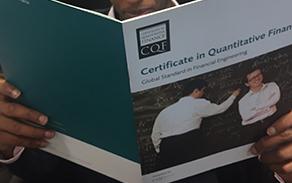In Conversation with CQF Alumni: Jean-Paul Kachour

Jean-Paul Kachour, Head of Core Systematic Portfolio, Abu Dhabi Investment Authority (ADIA)
Jean-Paul earned the CQF in 2021 and is now Head of the Core Systematic Portfolio at ADIA. We spoke to him about moving from engineering to finance and the importance of having a growth mindset.
Why did you decide to pursue your current career path?
Initially, I was entirely focused on pursuing a career in engineering, studying applied sciences in Canada before several circumstances took me down a different path towards finance. Following a classic finance undergrad experience, I began work on the consulting side before entering a graduate program in financial engineering - my first proper introduction to quantitative finance. After that, I was recruited by PSP investments, on the asset owner side, combining social mission thinking and the fiduciary responsibility of managing pension assets for the federal civil service, the national police, and the armed forces. At PSP, I was responsible for growing our active management book, partnering with hedge funds, and ultimately delivering returns.
Where did you go after your time at PSP?
I joined ADIA, where I was brought in for my emerging markets expertise. I was attracted by the opportunity, as the organization was ramping up efforts to be an early investor in key markets such as China and India. I was eventually given broader portfolio management responsibilities across both emerging and developed markets, with increasing exposure to quantitative investing. Classic financial academia on risk premia, optimization, and risk management is conducted from the point of view of bottom-up stock investing, leaving quite an unchartered space for multi-PM, multi-asset investments and ultimately very fertile ground for development. Just as quantitative investing was experiencing seismic shifts due to unstructured data and machine learning techniques evolving leaps and bounds, I was tasked with an entirely new and exciting opportunity to launch a very different systematic fund of funds. This meant gaining a deep understanding of the underlying quant strategies and partnering with the very best quant investors out there. For me, this was the catalyst for taking on the challenge of the CQF program.
What should people look out for as they're building a career?
Most of the CQF audience already come from technical backgrounds and have an appreciation of the quant finance and data revolution that is all around us and will only accelerate, given where we are today. You must adopt a growth mindset, focus on skills development, and acquire knowledge across multiple domains, because you don't know where your career may go over the next five to ten years. I think the idea of having one linear path for 30 years is most likely a thing of the past, especially as we see how the traditional asset management business has been disrupted. Who will be the employer of choice within five years? It will be anybody's guess, but hard quant skills and the mindset of being equipped to solve any type of problem will always be attractive to employers.
Obviously, you had a lot of career experience before you enrolled in the CQF program. What were some of the key reasons for seeking out this additional education?
I'd looked at the CQF previously, but with the transition to the dedicated quant role, I really felt the need to refresh my statistical background and go further into the world of machine learning. The curriculum was Python based, which made it broader in scope, and the weight given to machine learning developments in the context of portfolio management and risk management was extremely attractive to me. In my day-to-day job, I need to speak the language of the very best quant investors while running an overall portfolio, enhancing it such that the whole becomes greater than the sum of the parts.
From your purview in the markets, what skill sets should people be pursuing aggressively?
When I started my career, everything was based on Excel, where one could get away with a bit of VBA and maybe some MatLab. Since then, the world has turned upside down with the democratization of data. There's so much more information available, and you must be able to tap into it just to be on a level playing field, to say nothing of having an information edge. Even in the discretionary world, Python and related analytical skill sets are critical now. You may hear the adage that machine learning will not replace a senior manager, but a senior manager who understands ML will replace one who doesn't. So, the way that we manage the portfolios, the way that we condition our decisions, how we collect the information from all our counterparties, all of that requires a far greater degree of sophistication than it did in years past. Those that directly invest in the markets and especially in the derivatives space will benefit greatly from the CQF. These may be people who have strong engineering or computer science backgrounds and were attracted to finance. They are drawn to the challenges of solving for non-stationarity and low signal-to-noise ratios, in the effort to beat the markets. This area of finance attracts a very different personality type, and they are at the forefront of what the CQF has to offer.
What advice would you give to someone starting their career today?
In a world that increasingly focuses on and rewards specialization, new entrants in the market need to develop domain expertise in more than one area while also being on the lookout for emerging opportunities to stand out. One should not be complacent, as employers are looking for adaptability, world class skills and commitment.
Find out more about the CQF program
To discover how the CQF program could help you go further in your career, download a brochure or register to join an information session.




